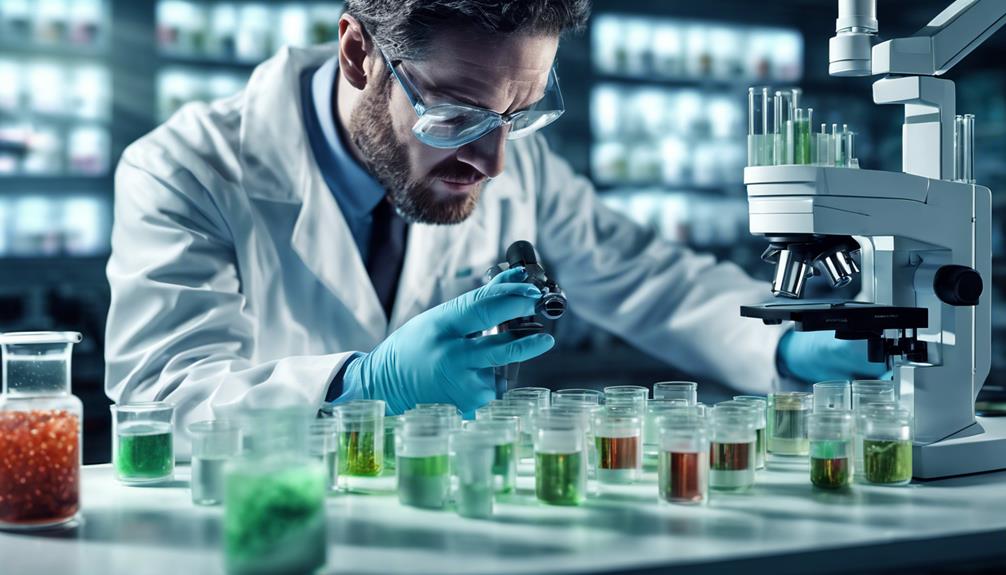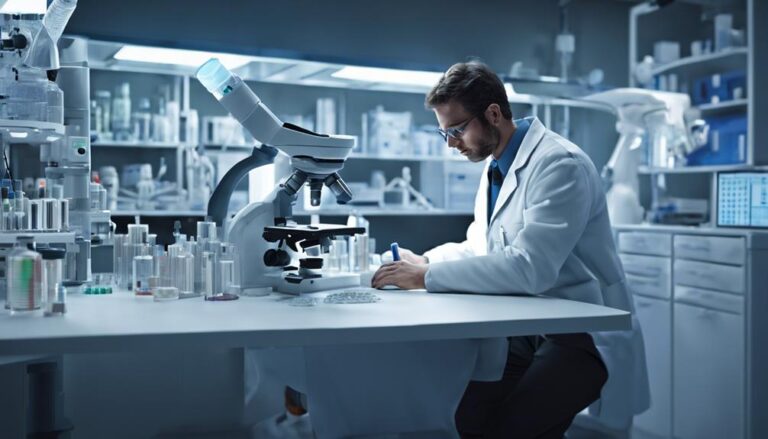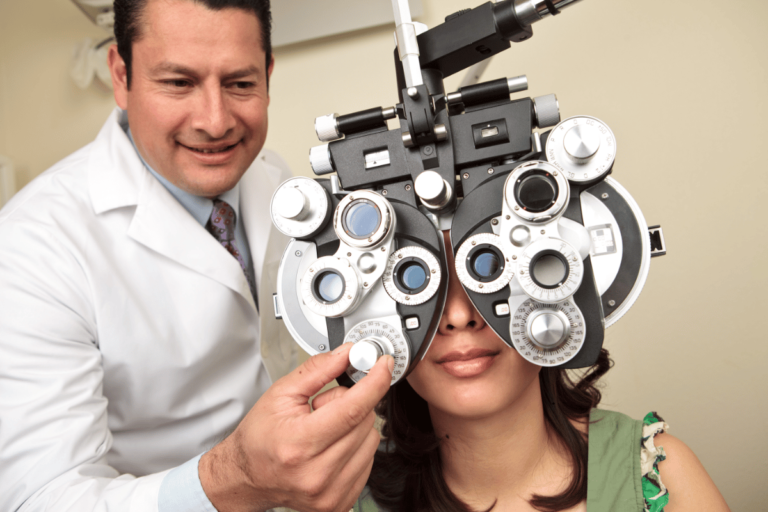Microbiologist Job Description
Immerse yourself in the fascinating world of microbiology where you study microorganisms and their impact on the environment. Progress from entry-level roles to supervisory positions or specialize in medical or environmental microbiology. Gain a bachelor's degree to start in research labs; pursue a master's or Ph.D. for advanced roles. Master lab techniques, identify microorganisms accurately, and interpret complex scientific data. Explore diverse work settings, from field research to industry applications. Utilize tools like microscopes, PCR, and culturing techniques. Uncover the secrets of the microbial world and begin a rewarding journey in microbiology.
Key Takeaways
- Study microorganisms and their interactions with the environment.
- Utilize lab techniques like bacterial culture and molecular biology.
- Identify microorganisms accurately using specialized methods.
- Contribute to scientific advancements in various industries.
- Opportunities for career growth, specialization, and leadership roles.
Overview of Microbiologist Role
When working as a microbiologist, you'll play an essential role in studying microorganisms and their interactions with the environment. As a microbiologist, you'll have the opportunity for career advancement and a promising salary potential. In this dynamic field, you can progress from entry-level positions to senior roles through gaining experience, expanding your knowledge, and demonstrating proficiency in your work.
Career advancement opportunities for microbiologists can include moving into supervisory or managerial positions, leading research teams, or specializing in a particular area such as medical microbiology or environmental microbiology. With experience and expertise, you could also venture into academia, consulting, or pharmaceutical industries, broadening your career horizons while contributing to advancements in science and technology.
In terms of salary potential, microbiologists are well-compensated for their specialized skills and contributions to research and development. Salaries can vary based on factors such as education, experience, location, and the specific industry you work in. With dedication and continuous learning, you can enhance your earning potential and establish a rewarding career as a microbiologist.
Educational Requirements for Microbiologists
Exploring the educational pathway to become a microbiologist opens doors to a domain where scientific knowledge and practical skills converge to shape your career in this specialized field. To begin on this journey, you typically need a minimum of a bachelor's degree in microbiology or a related field. However, to advance in your career and access more specialized roles, pursuing a master's or a Ph.D. in microbiology is often necessary.
Career pathways for microbiologists can vary based on the level of education obtained. With a bachelor's degree, you can work in entry-level positions in research laboratories, quality control, or as a laboratory technician. A master's degree can lead to roles such as microbiology research scientist or laboratory manager. For those aiming for leadership positions in research, academia, or advanced scientific roles, a Ph.D. in microbiology is essential.
Degree requirements play an essential role in shaping your expertise and opening up opportunities within the field of microbiology. By investing in higher education, you equip yourself with the knowledge and skills needed to excel in this dynamic and impactful field.
Key Responsibilities of Microbiologists
As a microbiologist, you'll be responsible for mastering various lab techniques important for conducting experiments and analyzing data effectively.
Additionally, you'll play a key role in identifying different microorganisms using specialized methods to guarantee accurate results.
Your expertise in data analysis techniques will be essential for interpreting complex scientific information and drawing meaningful conclusions.
Lab Techniques Overview
To effectively carry out your responsibilities, you, as a microbiologist, utilize a wide range of lab techniques to study microorganisms and their impact on various environments and organisms. Some of the key lab techniques you employ include:
- Bacterial culture techniques: Cultivating bacteria in controlled environments to study their growth and behavior.
- Microscopic examination methods: Using microscopes to visualize microorganisms at the cellular level.
- Staining procedures: Applying dyes to differentiate between different types of microorganisms based on their cell structures.
- Biochemical tests: Conducting experiments to analyze the metabolic activities of microorganisms.
- Molecular biology techniques: Using tools like PCR to study the genetic material of microorganisms.
These techniques are essential in unraveling the mysteries of the microbial world.
Microorganism Identification Methods
Explore the intricate world of microbiology by mastering various microorganism identification methods essential for your role as a microbiologist.
Microbial diversity analysis allows you to investigate the vast array of microorganisms, understanding their unique characteristics and behaviors.
Utilizing biochemical characterization techniques, you can identify the metabolic capabilities of different microbes, aiding in their classification and study.
These methods involve analyzing cellular structures, biochemical reactions, and genetic makeup to distinguish between various microorganisms accurately.
Data Analysis Techniques
Explore the world of data analysis techniques, essential to the key responsibilities of microbiologists, to uncover valuable insights from complex microbial datasets. When analyzing data as a microbiologist, you'll need to utilize various tools and methods to extract meaningful information.
Here are some key techniques to master:
- Data visualization tools: Utilize graphs and charts to represent complex data visually.
- Statistical analysis: Apply statistical methods to draw conclusions from experimental results.
- Machine learning applications: Implement algorithms to identify patterns and make predictions based on data.
- Data interpretation: Analyze and interpret data to understand the behavior of microorganisms.
- Database management: Organize and manage data efficiently for easy access and retrieval.
Mastering these techniques will enable you to make informed decisions and contribute significantly to the field of microbiology.
Skills and Qualities Needed
To excel as a microbiologist, you'll need essential expertise in various scientific areas, such as biology and chemistry.
Key attributes like attention to detail and problem-solving skills are important for success in this role.
Required technical proficiency in laboratory techniques and data analysis will also be essential for your work as a microbiologist.
Essential Expertise for Microbiologist
Developing a strong foundation in key scientific principles is essential for aspiring microbiologists. To excel in microbiologist research and experiments, you need to possess the following expertise:
- Laboratory Techniques: Proficiency in handling various scientific equipment and tools.
- Analytical Skills: Ability to analyze complex data and draw meaningful conclusions.
- Attention to Detail: Being meticulous in observations and recording of experimental results.
- Problem-Solving Abilities: Aptitude for identifying and resolving scientific challenges.
- Communication Skills: Effectively conveying research findings through reports and presentations.
These skills are vital for success in the field of microbiology, enabling you to conduct valuable research and contribute significantly to scientific advancements.
Key Attributes for Success
To succeed as a microbiologist, you must exhibit a unique blend of technical proficiency and critical thinking skills. Team collaboration is essential in the field of microbiology, as it often involves working with other scientists, researchers, and healthcare professionals to analyze data and draw conclusions. Critical thinking plays an important role in problem-solving, experimental design, and interpreting complex results.
Being able to think analytically and approach challenges logically is key to success in this role. Additionally, effective communication skills are essential for sharing findings, collaborating with colleagues, and presenting research to diverse audiences. Flexibility, attention to detail, and a passion for scientific inquiry are also key attributes that can help you excel as a microbiologist.
Required Technical Proficiency
A microbiologist must possess a high level of technical proficiency in laboratory techniques, data analysis, and experimental design to excel in this field. To thrive in this role, you need the following skills and qualities:
- Lab Safety: Understanding and implementing proper safety protocols to guarantee a secure working environment.
- Equipment Maintenance: Proficiency in maintaining and calibrating laboratory equipment for accurate results.
- Quality Control: Ability to conduct quality control measures to assure reliable data outcomes.
- Regulatory Compliance: Knowledge of regulations and guidelines to make sure all work meets legal requirements.
- Data Analysis: Proficiency in analyzing and interpreting complex data sets to draw meaningful conclusions.
Developing these skills won't only enhance your performance but also contribute to your success as a microbiologist.
Work Environments for Microbiologists
When considering the work environments for microbiologists, it's vital to understand the diverse settings in which these professionals conduct their research and experiments. Microbiologists engage in field research, where they collect samples from various environments such as soil, water, and air to study microbial life in its natural habitat. This fieldwork allows for a hands-on approach to understanding how microorganisms interact within ecosystems.
Microbiologists also work in industry applications, where they play a pivotal role in areas such as pharmaceuticals, food and beverage production, and environmental monitoring. In these settings, microbiologists focus on developing new products, ensuring quality control, and maintaining sanitary conditions to prevent contamination.
Whether in the field or in industrial settings, microbiologists utilize their expertise to analyze data, conduct experiments, and draw conclusions that contribute to scientific knowledge and practical applications. The work environments for microbiologists offer a dynamic and challenging landscape where their skills are instrumental in various scientific and industrial advancements.
Tools and Techniques Used
Various specialized tools and techniques are employed by microbiologists in their research and experimentation processes. These tools and techniques play an essential role in the analysis and understanding of microorganisms. Here are some commonly used tools and techniques:
- Microscopes: Microbiologists use various types of microscopes such as light microscopes, electron microscopes, and fluorescence microscopes to observe microorganisms at different levels of magnification.
- PCR (Polymerase Chain Reaction): This technique is used to amplify DNA samples, allowing microbiologists to study and analyze the genetic material of microorganisms.
- Culturing Techniques: Microbiologists use culturing techniques to grow and study microorganisms in controlled laboratory conditions.
- Sequencing Technologies: Next-generation sequencing technologies are utilized to determine the genetic makeup of microorganisms, aiding in research and identification.
- Bioinformatics Tools: Microbiologists use bioinformatics tools to analyze large sets of biological data, helping in research and understanding complex microbial interactions.
Career Opportunities and Growth
Exploring a career in microbiology offers a multitude of opportunities for growth and advancement in the ever-evolving field of science. As a microbiologist, you have the potential for significant career growth as you gain experience and expertise. With advancements in technology and research, the demand for skilled microbiologists continues to rise, creating a variety of career paths to pursue.
In terms of salary potential, microbiologists are well-compensated for their specialized skills and knowledge. Entry-level positions typically offer competitive salaries, and as you progress in your career and take on more responsibilities, your earning potential increases. Microbiologists working in research institutions, pharmaceutical companies, and government agencies often have access to higher salary brackets and additional benefits.
Moreover, as you establish yourself in the field, there are opportunities for advancement into leadership roles, such as becoming a research team leader, project manager, or department head. Continuous learning and staying updated on the latest developments in microbiology will further enhance your career growth prospects.
Frequently Asked Questions
How Do Microbiologists Contribute to Public Health and Safety?
You help safeguard public health and safety by preventing diseases, monitoring outbreaks, and ensuring food and water safety. As a microbiologist, your work directly impacts the well-being of communities by identifying and combating potential threats.
What Are the Typical Career Pathways for Microbiologists?
You're exploring a vast terrain of career opportunities as a microbiologist. Industries demand your expertise, offering pathways for advancement and promising salary prospects. Embrace the journey, exploring the field's diverse landscapes.
Are There Any Specific Certifications or Licenses Required for Microbiologists?
To work as a microbiologist, you may need specific certifications or licenses depending on industry standards. Continuing education and professional development opportunities are available to help you stay current with advancements in the field.
What Are the Current Trends in Microbiology Research and Technology?
Plunge into the intricate world of microbiology trends. Bioinformatics applications expose hidden secrets, while Microbiome studies illuminate the microbial universe. Gene editing techniques revolutionize research, combating antibiotic resistance. Stay curious, for each discovery reveals new mysteries.
How Do Microbiologists Stay Updated on Advancements in the Field?
To stay updated on advancements in microbiology, you can utilize online resources, attend seminars, collaborate with peers, and participate in conferences. These avenues provide valuable insights and networking opportunities essential for professional growth in the field.
Conclusion
To sum up, being a microbiologist is akin to being a detective, uncovering mysteries at the microscopic level. With a solid educational background, key responsibilities, and necessary skills, you can excel in this field.
Whether working in a lab, hospital, or research facility, the opportunities for growth and advancement are limitless.
So, if you have a passion for science and a curious mind, consider pursuing a career as a microbiologist and start on a journey of discovery.







